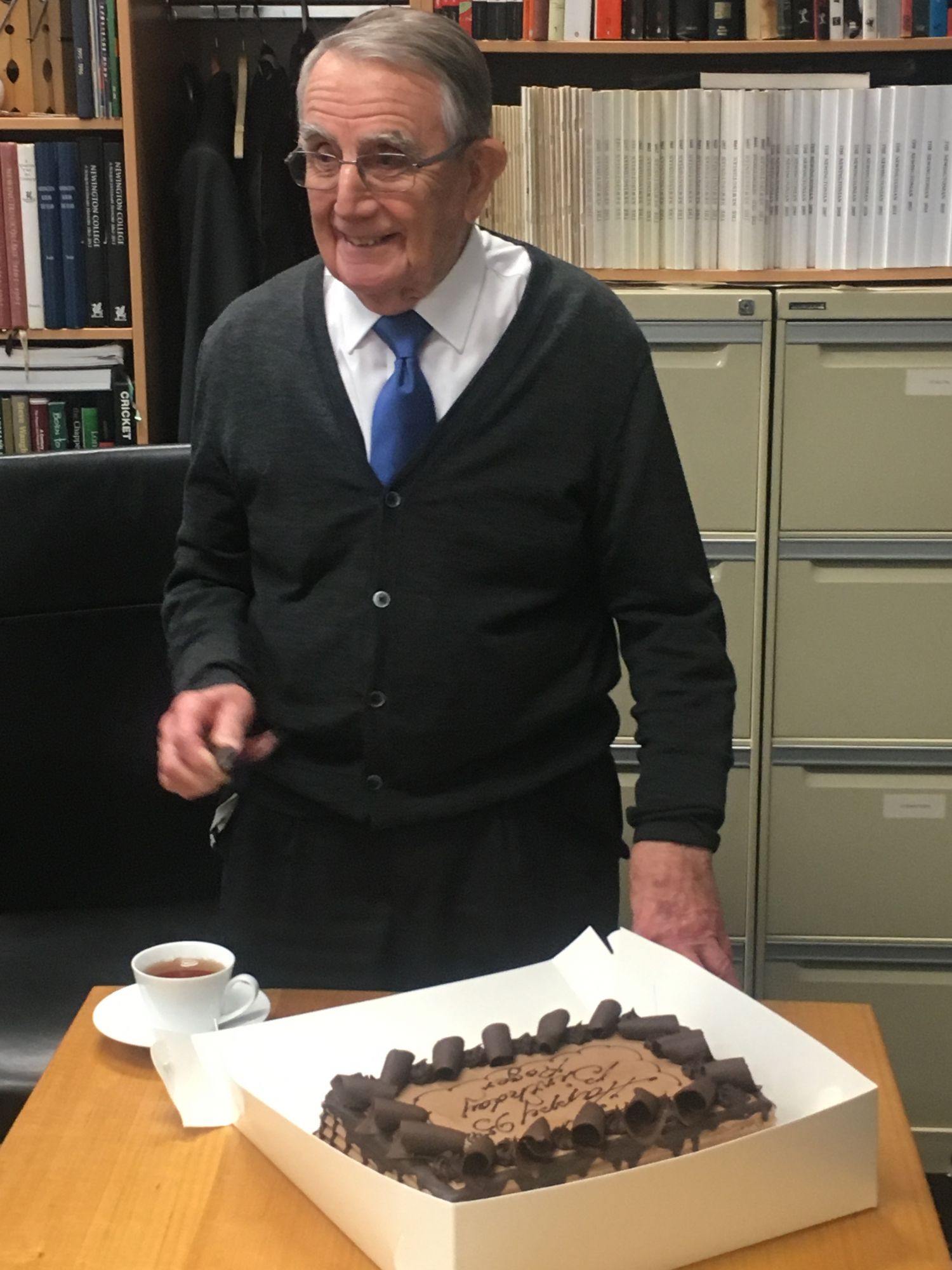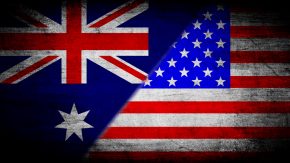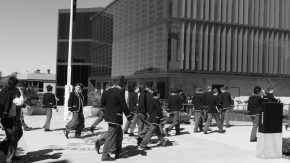Happy Birthday Dr Roger Davidson OAM
Dr Roger Davidson’s 95th Birthday was celebrated at the College on Friday 17 August 2018.
Roger’s association with the College commenced as a student in 1932, 87 years ago. Everyday we are proud of and celebrate Roger’s work for and love of Newington.
Here is Roger’s story:
Roger Madgwick Davidson OAM went to school at Newington College from 1932 to 1940.
Roger’s father was a doctor in general practice in Enmore, where the family lived. Roger’s older brother James had started at the College in 1928; his younger brother George was to follow him in 1934.
Roger had attended the Petersham and Apsley Grammar School, a small primary school on the site of the later Concordia Club, with his sister. He entered Newington College at the age of nine and, living within walking distance of the school, was enrolled as a Day Boy. He was placed in Form I and in Fletcher House. Houses had only just been formed at the beginning of 1932, being one of the innovations of the new Headmaster, P R Le Couteur, who had arrived at the school in the previous September. Reflecting the impact of the Depression, there were only twelve boys in Form I at the start of the year, with four more entering the class during the course of the year.
Roger studied the then standard junior subjects of English, History, Geography, Arithmetic, Writing, Reading, Dictation/Spelling and Scripture. We are able to trace his academic progress in some detail because of another of Le Couteur’s innovations: the use of standardised mark sheets, in which each boy’s marks each term for each subject, along with his total and average marks for the term and his overall place in the form. Roger showed himself a capable student at once, typically coming between third and fifth during his first two years.
While the division between the preparatory and senior schools was less clear at this stage (Wyvern House was not to be established until 1939), there was a recognised transition from junior to senior schooling in which Form III may be regarded as the equivalent of today’s Year 7. So, from 1934, Roger studied the standard middle school subjects of English, French, Latin, mathematics subjects (Algebra, Arithmetic, Geometry), Geography, History, Physics, and later Chemistry, along with Scripture. From 1935 he was in the ‘A’ stream of classes. He gained his Intermediate Certificate in 1937. Along with a number of other boys, he repeated his Form VI year in order to obtain a good Leaving Certificate pass. His 1940 Leaving results enabled him to enter the Faculty of Medicine at the University of Sydney the following year.
Beyond his studies, Roger pursued a range of interests while at school. In sport, his great passion was cricket. He played in the 3rd XI in 1938 and, by his final year, he was a member of the 1st XI. He was a capable batsman, often opening for team, and is recorded as ‘very steady’ and batting ‘in fine style’ to reach 53 in the first innings of the first match of the season against The King’s School in 1940. He was a good fieldsman too and was credited with a series of catches during the season.
Another great interest at school was music. He learned to play the cello and played in the orchestra that was established as part of the Musical Society, later known as the Music Club, led by the Headmaster’s wife. The club promoted the appreciation of music through gramophone recordings, lectures and recitals by visiting singers and musicians. It also featured a choir and a percussion band and put on a range of musical performances as part of chapel services and through concerts. Roger is recorded as being among a group of boys who sang ‘Old Mother Hubbard’ as an unaccompanied vocal item at the Music Club concert of 1936. He is best known, though, as a member of the ‘Wyvern Syncopators’, a jazz band formed in 1939. The band played the popular ‘swing’ music of the era, with Old Boy Talbot Duckmanton ‘crooning’ for them. They made their debut at the Boarders’ Breaking-Up Party at the end of the first term, performed as part of the year’s major concert and provided part of the music for the annual school play. Roger was also an active member of the Music Club and was elected Assistant Secretary in 1939.
Roger was also a keen Cadet. While service in the Cadet Corps was compulsory, interested boys could seek promotion and stay on for additional years. Roger was promoted from Lance-Corporal to Corporal early in 1940.
In addition to these activities, Roger served as a member of the Editorial Staff for The Newingtonian in 1940 and was appointed a Probationer Prefect for that year.
After leaving Newington College, Roger studied medicine and practised as a general practitioner. His practice through his career was in nearby Enmore, keeping him in contact with the College and its community. He maintained his connections with his schoolmates through the Old Newingtonians’ Union, of which he served as President in 1972–73, and as a foundation member and office holder in Lodge Wyvern, a Masonic Lodge affiliated with the ONU and established in 1950. More recently Roger has been involved in the establishment of the 70 Club; he has served as its Chairman and continues as a committee member.
Roger served for more than thirty years as the College’s honorary medical officer, treating both Boarders and Day Boys when needed and attending to sports injuries at weekends. In the latter connection, he established a Saturday Sports Clinic, the records of which provided the basis for a long-term survey of schoolboy rugby injuries. The results of this pioneering analysis were used at a national level to improve the management of such injuries. He was awarded a NSW Sports Safety 2000 Award Silver Medal in 1998 for ‘outstanding achievement in applied research in sports medicine’ and an Australian Sports Medal in 2000 in recognition of his contribution to reducing the impact of injuries in schoolboy sport.
Roger served as a member of the College Council from 1968 to 2002 and as its Honorary Secretary from 1982 to 2002. In this period he worked with three Headmasters and contributed his knowledge and wisdom to its work in a period of great development and change for the College. Most recently Roger has led the team of volunteers working with the College’s archives, contributing a huge amount of time and effort to the task. In 2008 the College recognised his outstanding contributions and achievement in his profession and his services to the College and its community, through the award of its highest honour, the Newington Medal.
Roger’s service ethic has extended beyond Newington College and its community. His honorary medical work with the Salvation Army resulted in him being made a member of its Distinguished Auxiliary Order and the award of the Distinguished Service Cross of the order in 1970.
Roger’s connections with Newington took on a further dimension when his son Timothy attended the College from 1963 to 1972.
Roger has continued to make his musical talents, especially as a cellist and pianist, available as part of the life of the College and its community.
Newington College is proud of Roger’s achievements as a student and in his subsequent life and is grateful for the many ways in which he has served our community. We are glad that he has continued his association with the College.






